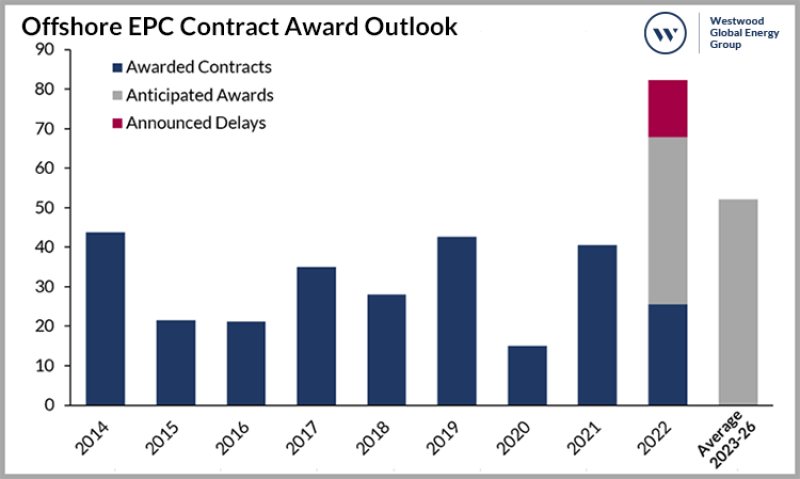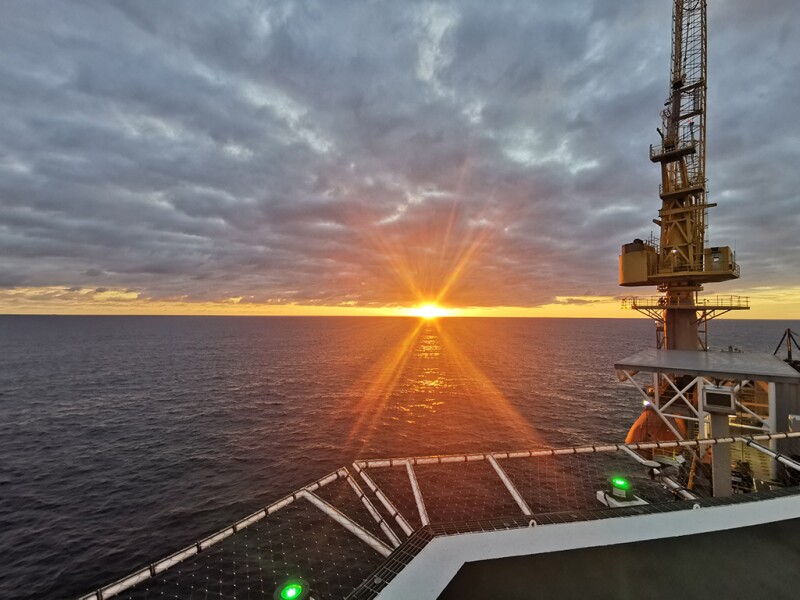Higher commodity prices at the end of 2021 and into the new year helped drive expectations higher for increased activity in the offshore oil and gas engineering, procurement, and construction (EPC) sector.
Challenges have tempered that optimism according to a new report by Westwood Global Energy Group.
The energy market research and consultancy firm noted in its review of EPC activities in the first half of 2022 were a “mixed bag."
“Emboldened by Brent oil price averaging $70 per barrel in 2021 and $107 per barrel in the first half of 2022, there were high expectations for an influx of offshore EPC awards,” Westwood said in the report.
“However, despite an increase in early-stage engagement of the supply chain by E&Ps and a steady growth in the number of pre-sanction projects, the optimism for a bumper year has been somewhat tempered, with Westwood’s 2022 offshore EPC contract award value now estimated to close at $68 billion, 18% lower than our January 2022 outlook.”
Westwood cited delays in project sanctioning as the reason for the decline, as some operators remodel project economics due to supply chain inflationary pressures that could range between 10% to 15% for subsea equipment and production platforms.
“It’s been challenging for the supply chain to scale up quickly after being forced to downsize during the pandemic. This has led to limited participants in some EPC tenders, causing operators to continually extend bid deadline dates or retender for projects to increase competition, forcing a delay on the project-sanctioning timeline,” it said.
Table 1: First half 2022 FID delays
| Project | Operator | Location |
| Rosebank development | Equinor | United Kingdom |
| Cameia-Golfinho project | TotalEnergies | Angola |
| Preowei field | TotalEnergies | Nigeria |
| Block B project | PetroVietnam | Vietnam |
| Bestari project | Petronas | Malaysia |
Source: Westwood Global Energy Group
While the delayed projects (Table 1) are expected to be sanctioned over the next 18 months, projects such as Shell’s Linnorm (Norway) and Aker Energy’s Pecan (Ghana) have been shelved indefinitely, Westwood said.
Shell is exploring alternative development concepts for the field, it added, noting that Aker Energy is seeking potential farm-in partners for Lukoil’s stake in the Pecan field due to uncertainties surrounding the complexity of possible future Western sanctions against the Russian-based operator.
In the Americas, Shell is working with Equinor to complete and update the field development plan (FDP) for its recently acquired Sparta field (formerly known as North Platte) in the US Gulf of Mexico. However, no development timeline has been announced after TotalEnergies ditched development plans and relinquished its 60% stake in the field earlier this year.
In Suriname, following the announcement of the Krabdagu discovery in Block 58 in February 2022, TotalEnergies and block partner Apache opted to prioritize the appraisal of existing Block 58 discoveries alongside further exploration ahead of previously stated development plans within the block, with development of existing discoveries not anticipated to commence until 2024.EPC Award Activity Remains Robust Despite Delays
Westwood noted that offshore oil and gas EPC-related contracting activity in the first half of 2022 has been robust, with an estimated award value of approximately $26 billion—a threefold increase compared to the first half of 2021.
The spend, according to the consultancy, was driven by 123 subsea tree unit awards, eight floating production systems (FPS)—four newbuilds, two conversions, two upgrades/redeployments, 52 fixed platforms (topsides), more than 995 miles (1600 km) of subsea umbilicals, risers and flowlines (SURF) and 1,030 miles (1660 km) of line pipe.
Major projects sanctioned in the first half of 2022 include ExxonMobil’s Yellowtail development offshore Guyana, LLOG’s Leon Castile fields in the US Gulf of Mexico, Shell’s Crux project offshore Australia, Equinor’s Haltenbanken East offshore Norway, ADNOC’s Umm Shaif–Long Term Development Phase I, and Saudi Aramco’s Zuluf Incremental project.Outlook For Second Half of 2022
Westwood estimated offshore oil and gas EPC-related awards to total $42 billion, driven by contract awards for 138 subsea tree units, 15 FPS units, 119 fixed platforms (topsides), more than 2,400 miles (3870 km) of SURF and 2,175 miles (3500 km) of line pipe.

Sixty percent of the expected fixed platform topsides awards in second half of 2022 will be driven by Saudi Aramco, as the national oil company continues to invest in its Abu Safah, Manifa, Safaniya, and Zuluf projects, with 50 platform jackets already awarded across these fields in the first half of 2022.
Other key contract awards to watch in the second half of 2022 include Shell’s Gato do Mato in Brazil, Aker BP’s NOA Fulla and Wisting project offshore Norway, QatarEnergy’s North Field Compression phase one project, as well as Woodside Energy’s Trion project offshore Mexico.
However, FID on Trion could be delayed beyond 2022 due to the recently completed merger of BHP’s oil and gas portfolio with Woodside Energy Group, as the operator aims to gain full knowledge of the BHP assets it has inherited, according to the Westwood report.
After the turbulent 2020–2021 period denominated by the COVID-19 pandemic and the erosion of oil demand and a crash in oil prices, the offshore sector is ready for a flurry of investment to make up for limited spending over the past few years, according to Westwood.
The US Energy Information Administration predicts Brent oil price to average $104/bbl and $94/bbl in 2022 and 2023, respectively, setting the tone for an upcycle. Westwood’s SubseaLogix and PlatformLogix market analytic tools show a sustained upcycle over the 2022–2026 forecast period in the absence of any significant shocks in oil and gas demand.
Offshore EPC spend during this period is expected to total $276 billion, a 71% increase compared to the preceding 5-year period, with Asia, the Middle East, and Latin America to dominate expenditures.
Westwood stated that untapped gas reserves in West Africa are expected to attract investments over the forecast period, as Europe urgently seeks alternative gas supplies to replace Russian feedstock.


